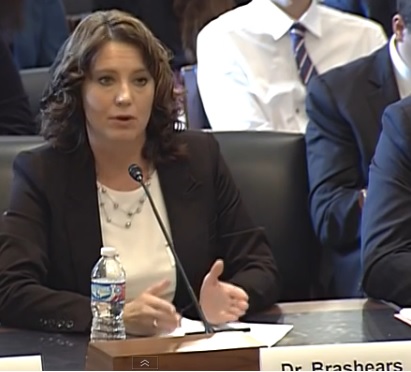
Agricultural News
Meat Industry Makes Strides in Food Safety, Dr. Brashears Says More Work Still Needed
Fri, 02 Oct 2015 15:19:39 CDT

Mindy Brashears began her career as a meat scientist at the University of Nebraska in the late 1990's, where she was at the forefront of early work on E. coli 0157. She came up with a protocol that has reduced the incidence of E. coli in live animals and in the final meat product. Today, Dr. Brashears' work continues at Texas Tech University, as the Director of the International Center for Food Industry Excellence. On Tuesday, she testified before the House Ag Committee on Food Safety Research efforts. In partnering with other faculty, she said they have conducted several feeding studies to determine if a cattle pro-biotic controlled pathogens in the feedlot. Brashears' probiotic product proved to work.
"After several studies, we found E. coli can be reduced up to 50 percent in live animals, thus reducing the risk of product contamination," Brashears said. "This product has been commercialized and is used in many feedyards across the United States."
The beef industry has also used other strategies to improve food safety. This includes implementation of the Hazard Analysis Critical Control Point (HACCP) and the use of antimicrobial intervention. Brashears said the government's investment in food safety research over the past 20 years has saved lives.
"In the early 1990's, we were scrambling for solutions to control E. coli, but federal investment in translational research delivered effective controls," Brashears said. "The FSIS testing shows that ground beef contamination has fallen more than 90 percent and the CDC reports that the human incidence has been cut in half."
Dr. Brashears was among several researchers testifying before a House Agriculture Sub-Committee this week. Witnesses discussed the successes they have had in agricultural research with funding from the federal government, which was allocated by Congress. Dr. Brashears told lawmakers while a lot of good things have already happened, there's still a lot of work to be done.
"However, the food safety problem is far from being solved, the incidence of Salmonellosis remains steady and illnesses associated with Campylobacter are actually rising," Brashears said. "Antibiotic resistance actually decreases our ability to treat many of the illnesses associated with these pathogens. The availability of funds for food safety research has decreased, which leaves scientists scrambling for limited resources."
Research at Texas Tech University can address problems on both the pre and post-harvest side of food processing. Dr. Brashears said recent data shows the probiotic that reduces E. coli in cattle, also reduces salmonella in lymph nodes, which is significant source of beef contamination.
Click here to read the full testimony from Dr. Mindy Brashears of Texas Tech.
Radio Oklahoma Network Farm Director Ron Hays featured Dr. Brashears on the Beef Buzz feature. Click or tap on the LISTEN BAR below to listen to today's Beef Buzz.
The Beef Buzz is a regular feature heard on radio stations around the region on the Radio Oklahoma Network- but is also a regular audio feature found on this website as well. Click on the LISTEN BAR below for today's show- and check out our archives for older Beef Buzz shows covering the gamut of the beef cattle industry today.
WebReadyTM Powered by WireReady® NSI
Top Agricultural News
More Headlines...



















